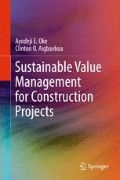Abstract
Value management can be described as a management tool that can be adopted for overall project management of construction projects. Other construction management techniques such as risk management, lean construction and management, total quality management, knowledge management, total asset management, and safety management can be incorporated into a value management study instead of setting up various management teams to manage these aspects for the same project. This chapter explains the application of value management for other construction management methods, techniques, and practices in the construction industry. It highlights various areas of the construction management techniques and how their practice can be incorporated into value management study. However, it should be noted that for some specific reasons, the highlighted and discussed management techniques will be more effective and efficient for a better performance of construction projects when they are integrated with value management study for the same project.
Access this chapter
Tax calculation will be finalised at checkout
Purchases are for personal use only
References
Abd Jamil, A. H., & Fathi, M. S. (2016). The integration of lean construction and sustainable construction: A stakeholder perspective in analyzing sustainable lean construction strategies in Malaysia. Procedia Computer Science, 100(2016), 634–643.
Adams, F. K. (2008). Construction contract risk management: A study of practices in the United Kingdom. Cost Engineering, 50(1), 22–33.
Amusan, L., Joshua, O., & Oloke, C. O. (2013). Performance of build-operate-transfer projects: Risks’ cost implications from professionals and concessionaires perspective. European International Journal of Science and Technology, 2(3), 239–250.
Andawei, M. M. (2001). Application of network-based techniques in the cost control and management of construction works. The Quantity Surveyors, 37(4), 24–27.
Banaitiene, N. & Banaitis, A. (2012). Risk management in construction projects. In N. Banaitiene (Ed.), Risk Management—Current Issues and Challenges (pp. 429–448). London: Intech Open Science. Retrieved September 14, 2016, from http://cdn.intechopen.com/pdfs-wm/38973.pdf.
Blakey, R. (2008). An introduction to lean construction. Retrieved November 14, 2016, from http://www.touchbriefings.com.
Carr, V., & Tah, J. H. (2001). A fuzzy approach to construction project risk assessment and analysis: Construction project risk management system. Advanced Engineering Software, 32(10–11), 847–857.
Dong-Gil, K., & Alan, R. D. (2011). Profiting from knowledge management: The impact of time and experience. Information Systems Research, 22(1), 134–152.
Edvinsson, L. (2002). Knowledge is about people, not databases. Industrial and Commercial Training, 31(7), 262–266.
Gluch, P. (2009). Unfolding roles and identities of professionals in construction projects: Exploring the informality of practices. Construction Management and Economics, October (2009), 959–968.
Isle of Man. Treasury Government Office. (2002). Procedure notes for management of construction project. Douglas: Treasury Government Office. Retrieved September 14, 2016, from https://www.gov.im/media/383284/procedure_notes_for_management_of_construction_projects.
Jorgensen, B., & Emmitt, S. (2008). Lost in transition: The transfer of lean manufacturing to construction engineering. Construction and Architectural Management, 15(4), 383–398.
Kam Shadan, P. E. (2012). Construction project management handbook. Washington: Federal Transit Administration. Retrieved September 14, 2016, from https://www.transit.dot.gov/sites/fta.dot.gov/files/FTA_Report_No._0015_0.pdf.
Koskela, L. (1992). Application of the new production philosophy to construction: Technical Report No. 72. CIFE. Stanford University, California.
Marhani, M. A., Jaapar, A., & Bari, N. A. (2012). Lean construction: Towards enhancing sustainable construction in Malaysia. Procedia—Social and Behavioral Sciences, 68(2012), 87–98.
Marhani, M. A., Jaapar, A., Bari, N. A., & Zawawi, M. (2013). Sustainability through lean construction approach: A literature review. Procedia—Social and Behavioral Sciences, 101(2013), 90–99.
Mead, P. (2007). Current trends in risk allocation in construction projects and their implications for industry participants. Construction Law Journal, 23(1), 23–46.
Murman, E., Allen, T., Bozdogan, K., Cutcher, J. G., McManus, H., & Widnall, S. (2002). Lean enterprise value: Insights from MIT’s Lean Aerospace Initiative. New York: Palgrave.
Odeyinka, H., Lowe, J., & Kaka, A. (2012). Regression modelling of risk impacts on construction cost flow forecast. Journal of Financial Management of Property and Construction, 17(3), 203–221.
Oke, A. E., Ogunsemi, D. R., & Adeeko, O. C. (2013). Assessment of knowledge management practices among construction professionals in Nigeria. International Journal of Construction Engineering and Management, 2(3), 85–92.
Project Management Institute. (2008). Guide to the project management body of knowledge (4th ed.). Newton Square: Project Management Institute.
Ravishankar, M. N., Pan, S. L., & Leidner, D. E. (2011). Examining the strategic alignment and implementation success of a KMS: A subculture-based multilevel analysis. Information Systems Research, 22(1), 39–59.
Sharimllah, D. R., Siong, C. C., & Hishamuddin, I. (2009). The practice of knowledge management processes: A comparative study of public and private higher education institutions in Malaysia. Journal of Information and Knowledge Management Systems, 39(3), 203–222.
Tah, J. H., & Carr, V. (2000). A proposal for construction project risk assessment using fuzzy logic. Construction Management and Economics, 18(4), 491–500.
The Associated General Contractors of America. (2003). Guidelines for a successful construction project. Washington: The Associated General Contractors of America, the American Subcontractors Association, and the Associated Specialty Contractors. Retrieved September 14, 2016, from https://www.discountpdh.com/course/guideline-on-general-contractor-subcontractorrelations.
Wang, S. Q., Dulaimi, M. F., & Aguria, M. Y. (2004). Risk management framework for construction projects in developing countries. Construction Management and Economics, 22(3), 237–252.
Washington State Department of Transportation. (2010). Project risk management: Guidance for WSDOT projects. Washington: Washington State Department of Transportation. Retrieved November 14, 2016, from http://www.wsdot.wa.gov/publications/manuals.
Womack, J. P., & Jones, D. T. (1996). Lean thinking. New York: Simon and Schuster.
Womack, J. P., & Jones, D. T. (2003). Lean thinking: Banish waste and create wealth in your corporation. New York: Simon and Schuster.
Author information
Authors and Affiliations
Corresponding author
Rights and permissions
Copyright information
© 2017 Springer International Publishing AG
About this chapter
Cite this chapter
Oke, A.E., Aigbavboa, C.O. (2017). Value Management as a Construction Management Tool. In: Sustainable Value Management for Construction Projects. Springer, Cham. https://doi.org/10.1007/978-3-319-54151-8_7
Download citation
DOI: https://doi.org/10.1007/978-3-319-54151-8_7
Published:
Publisher Name: Springer, Cham
Print ISBN: 978-3-319-54150-1
Online ISBN: 978-3-319-54151-8
eBook Packages: EnergyEnergy (R0)

